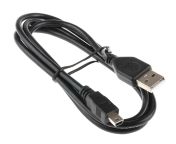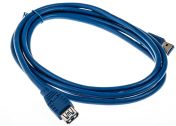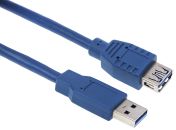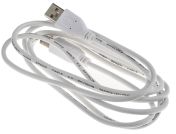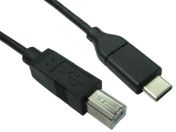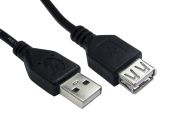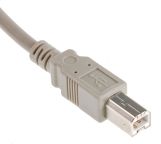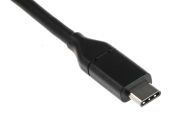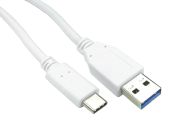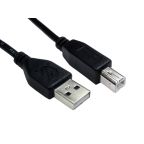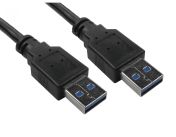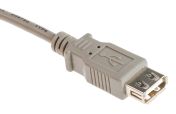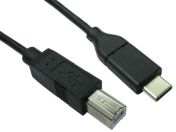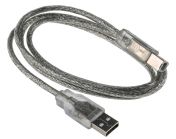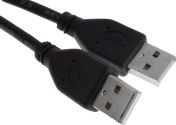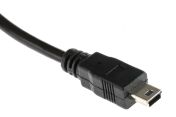USB Cables
USB cables, or Universal Serial Bus cables, are widely used for connecting various electronic devices to each other or to a computer. They provide a standardised interface for data transfer, power supply, and peripheral connectivity. USB cables have different types and connectors, each designed for specific purposes and device compatibility. Here are some commonly used USB cable types:
Types of USB Cables
It's important to note that USB cables can have different versions, such as USB 2.0, USB 3.0, USB 3.1, and USB 3.2, which determine their maximum data transfer speeds. The USB cable you need will depend on the specific devices you want to connect or charge.
USB Type-A
This is the most common USB connector and is rectangular in shape. USB Type-A cables are used for connecting devices like computers, laptops, power adapters, and USB hubs.
USB Type-B
USB Type-B Cables are mostly used for connecting printers, scanners, and other peripheral devices to computers. It has a square shape with bevelled corners.
Mini-USB
Mini-USB connectors were popular in the past but are now less common. They come in two forms: Mini-A and Mini-B. These cables were commonly used for connecting digital cameras, older smartphones, and other portable devices.
Micro-USB
Micro-USB cables are smaller and more commonly used in various devices, including smartphones, tablets, digital cameras, Bluetooth speakers, and many other portable devices. They are reversible, allowing insertion in either orientation.
USB Type-C
USB Type-C is a newer and versatile connector that is becoming increasingly popular. It is reversible like Micro-USB but has a smaller form factor. USB Type-C cables can be used for charging devices, data transfer, and connecting various peripherals. These cables support faster data transfer speeds and can deliver more power.
USB to USB Cables
USB to USB cables, also known as USB-A to USB-A cables, feature the same connector type on both ends. These cables are commonly used for connecting devices like external hard drives or USB hubs to computers. They are also used for data transfer between devices with USB-A ports. Variations include USB 2.0, USB 3.0, and newer versions, each offering different data transfer speeds.
USB-A to USB-B Cables
USB-A to USB-B cables have a USB Type-A connector on one end and a USB Type-B connector on the other. These cables are primarily used for connecting peripherals like printers, scanners, and external hard drives to computers.
USB B to USB C and USB C to USB B Cables
USB-B to USB-C cables have a USB Type-B connector on one end and a USB Type-C connector on the other. These cables allow you to connect older devices with USB-B ports to newer devices with USB-C ports. Conversely, USB-C to USB-B cables have a USB Type-C connector on one end and a USB Type-B connector on the other, enabling connections between newer USB-C devices and older peripherals with USB-B ports.
These types of cables help maintain backward compatibility, allowing you to use older devices with newer technology without needing to replace them. They bridge the gap between different USB generations, ensuring continued connectivity and functionality.
Common Uses of USB Cables
Data Transfer
USB cables allow you to transfer data between devices, such as transferring files between a computer and a smartphone, syncing data between a digital camera and a computer, or connecting external storage devices like USB flash drives or external hard drives to a computer.
Charging Devices
USB cables are commonly used for charging devices like smartphones, tablets, smartwatches, Bluetooth speakers, and other portable electronics.
Peripheral Connectivity
USB cables are used to connect various peripheral devices to a computer, such as printers, scanners, keyboards, mice, game controllers, webcams, and external monitors.
Firmware Updates
Many electronic devices, including smartphones, cameras, and gaming consoles, can receive firmware updates to enhance functionality or address security issues.
Audio and Video Output
USB cables are sometimes used to transmit audio and video signals.
Programming and Debugging
USB cables are essential for programming and debugging certain electronic devices.
Industrial Applications of USB Cables
While often associated with consumer electronics and home office setups, USB cables play a crucial role in various industrial sectors, enabling connectivity, data transfer, and control in diverse applications.
Industrial Automation
USB Type-A cables play a crucial role in connecting industrial equipment, such as programmable logic controllers (PLCs), sensors, and actuators, to control systems. They facilitate data transfer for monitoring, configuration, and programming, enabling efficient automation processes.
Data Acquisition and Testing
USB cables are widely used in data acquisition systems and testing equipment. They connect various sensors, instruments, and data loggers to computers, allowing for real-time data collection and analysis.
Telecommunications
USB cables are used for connecting and configuring telecommunications equipment, such as routers, modems, and network switches. They also enable firmware updates and diagnostics, ensuring optimal network performance.
Medical Devices
USB cables provide reliable connectivity for medical devices, enabling data transfer between patient monitoring systems, diagnostic equipment, and computers. Their ease of use and compatibility make them suitable for various healthcare applications.
Automotive
USB cables, including Micro-USB and USB Type-C cables, are increasingly used in automotive diagnostics, connecting onboard diagnostic systems (OBD-II) to computers for vehicle diagnostics and software updates. They also provide connectivity for in-car entertainment and navigation systems.
Robotics
USB cables are used to connect robotic systems to control computers, facilitating programming, data transfer, and real-time control. Their versatility and reliability make them suitable for various robotics applications.
How to Choose the Right USB Cables
USB cables are versatile and essential for connecting various devices. By understanding your industry needs and considering a few key factors, the selection process will be simplified.
Here are some essential tips to help you choose the right USB cable:
1. Connector Types
Identify the connector types on your devices. Common types include USB-A, USB-B, Mini-USB, Micro-USB, and USB Type-C. Ensure you choose a cable with the correct connectors on each end.
2. USB Version
Different USB versions (USB 2.0, USB 3.0, etc.) offer varying data transfer speeds. Choose a cable that supports the highest USB version compatible with your devices for optimal performance.
3. Cable Length
Select an appropriate cable length for your needs. Longer USB cables may experience signal degradation, so choose the shortest length that comfortably reaches between your devices.
4. Data Transfer Speed
If you require high-speed data transfer, opt for USB 3.0 or newer cables, which offer significantly faster speeds than USB 2.0.
5. Power Delivery
If you need to charge a device, ensure the cable supports the required power output. USB Type-C cables generally offer higher power delivery capabilities.
6. Durability
Consider the cable's durability, especially if it will be subjected to frequent bending or movement. Look for USB cables with reinforced connectors and braided shielding for added protection.
7. Shielding
For applications requiring minimal interference, choose shielded USB cables to protect against electromagnetic interference (EMI) and radio frequency interference (RFI).
Trusted USB Cables Manufacturer, Supplier & Distributor in Australia
RS Components is your trusted partner for all your USB cable needs in Australia. We are a leading manufacturer, supplier, and distributor of high-quality USB cables, offering a comprehensive range of options to suit diverse applications. Whether you need a micro USB cable for charging your smartphone, a USB-C to USB-C cable for data transfer, or a USB-A to USB-B cable for connecting peripherals, we have the perfect solution. We source our USB cables and USB connectors from reputable brands, ensuring reliable performance and durability.
In addition to USB cables, we also offer an extensive selection of other cables and wires to meet your connectivity requirements.
Buy USB Cables from RS
RS offers fast delivery of USB cables and electronics like computer cables and networking & coaxial cables. For more details on delivery services and fees, please refer to our Delivery page.
